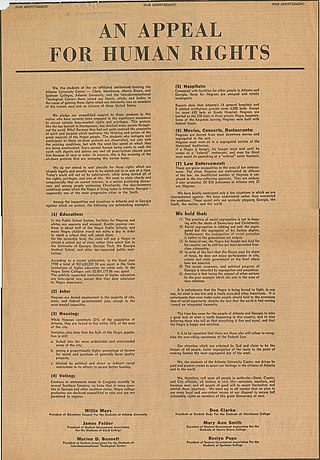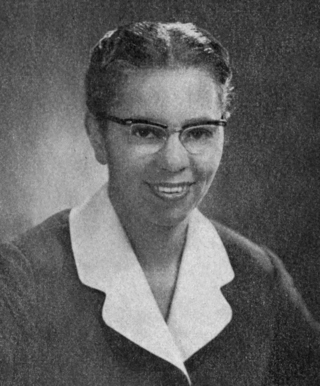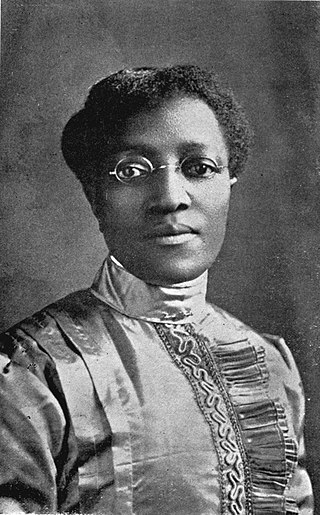Related Research Articles

Spelman College is a private, historically Black, women's liberal arts college in Atlanta, Georgia. It is a founding member of the Atlanta University Center academic consortium. Founded in 1881 as the Atlanta Baptist Female Seminary, Spelman awarded its first college degrees in 1901 and is the oldest private historically Black liberal arts institution for women.

James Forman was a prominent African-American leader in the civil rights movement. He was active in the Student Nonviolent Coordinating Committee (SNCC), the Black Panther Party, and the League of Revolutionary Black Workers. As the executive secretary of SNCC from 1961 to 1966, Forman played a significant role in the Freedom Rides, the Albany movement, the Birmingham campaign, and the Selma to Montgomery marches.
Xernona Clayton Brady is an American civil rights leader and broadcasting executive. During the Civil Rights Movement, she worked for the National Urban League and Southern Christian Leadership Conference, where she became involved in the work of Dr. Martin Luther King Jr. Later, Clayton went into television, where she became the first African American from the southern United States to host a daily prime time talk show. She became corporate vice president for Turner Broadcasting.

Doris Adelaide Derby was an American activist and documentary photographer. She was the adjunct associate professor of anthropology at Georgia State University and the founding director of their Office of African-American Student Services and Programs. She was active in the Mississippi civil rights movement, and her work discusses the themes of race and African-American identity. She was a working member of the Student Nonviolent Coordinating Committee (SNCC) and co-founder of the Free Southern Theater. Her photography has been exhibited internationally. Two of her photographs were published in Hands on the Freedom Plow: Personal Accounts by Women in SNCC, to which she also contributed an essay about her experiences in the Mississippi civil rights movement.

Sue Bailey Thurman was an American author, lecturer, historian and civil rights activist. She was the first non-white student to earn a bachelor's degree in music from Oberlin College, Ohio. She briefly taught at the Hampton Institute in Virginia, before becoming involved in international work with the YWCA in 1930. During a six-month trip through Asia in the mid-1930s, Thurman became the first African-American woman to have an audience with Mahatma Gandhi. The meeting with Gandhi inspired Thurman and her husband, theologian Howard Thurman, to promote non-violent resistance as a means of creating social change, bringing it to the attention of a young preacher, Martin Luther King Jr. While she did not actively protest during the Civil Rights Movement, she served as spiritual counselors to many on the front lines, and helped establish the first interracial, non-denominational church in the United States.

Ruby Doris Smith-Robinson worked with the Student Nonviolent Coordinating Committee (SNCC) from its earliest days in 1960 until her death in October 1967. She served the organization as an activist in the field and as an administrator in the Atlanta central office. She eventually succeeded James Forman as SNCC's executive secretary and was the only woman ever to serve in this capacity. She was well respected by her SNCC colleagues and others within the movement for her work ethic and dedication to those around her. SNCC Freedom Singer Matthew Jones recalled, "You could feel her power in SNCC on a daily basis". Jack Minnis, director of SNCC's opposition research unit, insisted that people could not fool her. Over the course of her life, she served 100 days in prison for the movement.

Cordy Tindell Vivian was an American minister, author, and close friend and lieutenant of Martin Luther King Jr. during the civil rights movement. Vivian resided in Atlanta, Georgia, and founded the C. T. Vivian Leadership Institute, Inc. He was a member of the Alpha Phi Alpha fraternity.

The Freedom Singers originated as a quartet formed in 1962 at Albany State College in Albany, Georgia. After folk singer Pete Seeger witnessed the power of their congregational-style of singing, which fused black Baptist a cappella church singing with popular music at the time, as well as protest songs and chants. Churches were considered to be safe spaces, acting as a shelter from the racism of the outside world. As a result, churches paved the way for the creation of the freedom song. After witnessing the influence of freedom songs, Seeger suggested The Freedom Singers as a touring group to the SNCC executive secretary James Forman as a way to fuel future campaigns. Intrinsically connected, their performances drew aid and support to the Student Nonviolent Coordinating Committee (SNCC) during the emerging civil rights movement. As a result, communal song became essential to empowering and educating audiences about civil rights issues and a powerful social weapon of influence in the fight against Jim Crow segregation. Rutha Mae Harris, a former freedom singer, speculated that without the music force of broad communal singing, the civil rights movement may not have resonated beyond of the struggles of the Jim Crow South. Their most notable song “We Shall Not Be Moved” translated from the original Freedom Singers to the second generation of Freedom Singers, and finally to the Freedom Voices, made up of field secretaries from SNCC. "We Shall Not Be Moved" is considered by many to be the "face" of the Civil Rights movement. Rutha Mae Harris, a former freedom singer, speculated that without the music force of broad communal singing, the civil rights movement may not have resonated beyond of the struggles of the Jim Crow South. Since the Freedom Singers were so successful, a second group was created called the Freedom Voices.
The Atlanta Student Movement was formed in February 1960 in Atlanta by students of the campuses Atlanta University Center (AUC). It was led by the Committee on the Appeal for Human Rights (COAHR) and was part of the Civil Rights Movement.
The Committee on the Appeal for Human Rights (COAHR) was a group of Atlanta University Center students formed in February 1960. The committee drafted and published An Appeal for Human Rights on March 9, 1960. Six days after publication of the document, students in Atlanta united to start the Atlanta Student Movement and initiated the Atlanta sit-ins in order to demand racial desegregation as part of the Civil Rights Movement. Early members of the group include, among others, Lonnie King, Julian Bond, Herschelle Sullivan, Carolyn Long, Joseph Pierce.

An Appeal for Human Rights is a civil rights manifesto initially printed as an advertisement in Atlanta newspapers on March 9, 1960 that called for ending racial inequality in Atlanta, Georgia, United States. The manifesto was written by students of Atlanta's six historically black colleges and universities that comprise the Atlanta University Center. It was drafted by Roslyn Pope and other students of the Atlanta University Center after the students, led by Lonnie King and Julian Bond, were encouraged by the six presidents of the Atlanta University Center to draft a document stating their goals. The students, organized as the Committee on Appeal for Human Rights (COAHR), published An Appeal for Human Rights working within and as part of the Civil Rights Movement.
Lonnie C. King Jr. was an American civil rights leader. Beginning in 1960, he launched the Atlanta Student Movement, wrote the Appeal for Human Rights, and subsequently started the Committee on Appeal for Human Rights. His work led to the desegregation of Atlanta and continued advocacy has brought further education to America regarding present-day racism and the struggles of the civil rights movement.

Willa Beatrice Player was an American educator, college administrator, college president, civil rights activist, and federal appointee. Player was the first African-American woman to become president of a four-year, fully accredited liberal arts college when she took the position at Bennett College in Greensboro, North Carolina.
Roslyn Pope was an American civil rights activist and academic. Pope is best remembered as an author of An Appeal for Human Rights while the president of the student government at Spelman College during the 1960 Atlanta Student Movement. The Appeal was first published as a paid advertisement in the Atlanta Constitution in March 1960. Pope received an Honorary Doctor of Humane Letters from Spelman College in 2013 for her years of service as a civil rights activist and educator.
Maxine (Atkins) Smith born in Memphis, Tennessee, United States, was an academic, civil rights activist, and school board official.

The sit-in movement, sit-in campaign or student sit-in movement, were a wave of sit-ins that followed the Greensboro sit-ins on February 1, 1960 in North Carolina. The sit-in movement employed the tactic of nonviolent direct action and was a pivotal event during the Civil Rights Movement.

Clara Ann Howard was an American educator and, from 1890 to 1895, a Baptist missionary in Africa.

Gwendolyn Zoharah Simmons, formerly Gwendolyn Robinson, is senior lecturer emerita following her retirement from the University of Florida in 2019. Her research has explored Islamic feminism and the impact of Sharia law on Muslim women. She is a civil rights activist, serving as a member of both the Student Nonviolent Coordinating Committee (SNCC) and the Nation of Islam (NOI). Simmons has received a number of prestigious fellowships, including a Fulbright Fellowship, USAID Fellowships, and an American Center of Oriental Research Fellowship.

Atlanta's Berlin Wall, also known as the Peyton Road Affair or the Peyton Wall, refers to an event during the civil rights movement in Atlanta, Georgia, United States, in 1962. On December 17 of that year, the government of Atlanta, led by mayor Ivan Allen Jr., erected a barricade in the Cascade Heights neighborhood, mostly along Peyton Road, for the purposes of dissuading African Americans from moving into the neighborhood. The act was criticized by many African American leaders and civil rights groups in the city, and on March 1 of the following year the barricade was ruled unconstitutional and removed. The incident is seen as one of the most public examples of white Americans' fears of racial integration in Atlanta.
The Atlanta sit-ins were a series of sit-ins that took place in Atlanta, Georgia, United States. Occurring during the sit-in movement of the larger civil rights movement, the sit-ins were organized by the Committee on Appeal for Human Rights, which consisted of students from the Atlanta University Center. The sit-ins were inspired by the Greensboro sit-ins, which had started a month earlier in Greensboro, North Carolina with the goal of desegregating the lunch counters in the city. The Atlanta protests lasted for almost a year before an agreement was made to desegregate the lunch counters in the city.
References
- 1 2 3 4 5 6 Challenor, Herschelle Sullivan (Interviewee) and Jeanne Law Bohannon (Interviewer) (August 25, 2017). Atlanta Student Movement Project: Dr. Herschelle Sullivan Challenor Interview (Transcript). Kansas State University Scholarly Online Access Repository.
- 1 2 Molzhan, Kathryn (July 17, 1966). "Interpreter Speaks Against Prejudice". Post-Crescent. Retrieved February 9, 2020.
- ↑ Zinn, Howard (2018). Howard Zinn's Southern Diary: Sit-ins, Civil Rights, and Black Women's Student Activism. Athens: University of Georgia Press. p. 62. ISBN 9780820353227.
- ↑ "To Study Abroad". The Crisis. 66: 573. November 1956 – via Google Books.
- 1 2 3 Lefever, Harry G. (2005). Undaunted by the Fight: Spelman College and the Civil Rights Movement, 1957/1967. Macon, GA: Mercer University Press. p. 19. ISBN 9780865549388.
- 1 2 3 Carson, Clayborne; Armstrong, Tenisha; Carson, Susan; Englander, Susan; Cook, Erin (2008). The Martin Luther King, Jr., Encyclopedia. Ann Arbor, MI: Greenwood Press. p. 53. ISBN 9780313294402.
- ↑ Lefever, Harry G. (2005). Undaunted by the Fight: Spelman College and the Civil Rights Movement, 1957/1967. Macon, Georgia: Mercer University Press. page 40. ISBN 9780865549388.
- ↑ "Herschelle Sullivan Challenor, C'60, Played a Significant Role in the Atlanta Student Movement". Spelman College. March 2016. Retrieved February 10, 2020.
- ↑ "Negros Will Enter the Teacher Program". Courier-Journal. March 19, 1961. Retrieved February 9, 2020.
- ↑ "Herschelle Sullivan". SAIS Magazine: 31. Summer 2018.
- ↑ King, Martin Luther, Clayborne Carson, Peter Holloran, Ralph E. Luker, and Penny A. Russell. 1992. The papers of Martin Luther King, Jr. Berkeley: University of California Press. p. 334. ISBN 9780520079502
- 1 2 3 4 5 6 United States Senate Committee on Foreign Relations (1983). Executive Council on Foreign Diplomats: Hearing Before the Committee on Foreign Relations, United States Senate, Ninety-eighth Congress, First Session, June 16, 1983. Washington, D.C.: United States Government Printing Office. p. 34.
- ↑ Chanellor, Herschelle (1970). French speaking West Africa's Dahomeyan strangers in colonization and decolonization (Doctoral thesis). New York City: Columbia University. OCLC 6888573.
- ↑ Grady-Willis, Winston A (2006). Challenging U.S. apartheid: Atlanta and black struggles for human rights, 1960-1977. Durham, NC: Duke University Press. p. 5. ISBN 9780822337782.
- ↑ King, Lonnie (2013). "Atlanta Student Movement Timeline Committee on Appeal for Human Rights (COAHR) 1960-1964". Civil Rights Movement Archive. Retrieved February 11, 2020.
- ↑ Grady-Willis, Winston A (2006). Challenging U.S. apartheid: Atlanta and black struggles for human rights, 1960-1977. Durham, North Carolina: Duke University Press. page 6.
- ↑ Conner, Alysha (February 22, 2019). "Legacy of the Atlanta Student Movement". Atlanta Voice. Retrieved February 9, 2020.
- 1 2 Lefever, Harry G. (2005). Undaunted by the Fight: Spelman College and the Civil Rights Movement, 1957/1967. Macon, GA: Mercer University Press. pages 62-3. ISBN 9780865549388.
- ↑ Fort, Vincent D (January 5, 1980). "The Atlanta Sit-In Movement, 1960-1961: an Oral Study". Digital Commons, Atlanta University Center: 32–34.
- ↑ Lewis, John; D'Orso, Michael (1998). Walking with the wind: a memoir of the movement. New York, New York: Simon & Schuster. p. 120. ISBN 9780684810652.
- ↑ Ferris, Marcie C (2014). The Edible South: The Power of Food and the Making of an American Region. Chapel Hill, NC: University of North Carolina Press. p. 280. ISBN 9781469617695.
- ↑ "Dawn's Early Light," Ralph McGill Papers, Woodruff Library, Emory University, Atlanta, GA. https://web.archive.org/web/20000824145052/http://www.unbrokencircle.org/scripts22
- ↑ Lefever, Harry G. (2005). Undaunted by the Fight: Spelman College and the Civil Rights Movement, 1957/1967. Macon, Georgia: Mercer University Press. page 51. ISBN 9780865549388.
- ↑ Galphin, Bruce (February 20, 1961). "Negroes at Rally Cheer Call for More Support". The Atlanta Constitution. Retrieved February 18, 2020.
- ↑ Galphin, Bruce (November 30, 1960). "Sit-In Chiefs Widen Downtown Protests". The Atlanta Constitution. Retrieved February 18, 2020.
- ↑ McCartney, Keeler (February 8, 1961). "Lonnie King, 12 Others Held Under $100 Bond in Sit-In". The Atlanta Constitution. Retrieved February 18, 2020.
- ↑ Sitton, Claude (February 9, 1961). "Fifty Choose Jail in 3-City Sit-Ins" (PDF). The New York Times. Retrieved February 18, 2020.
- ↑ Ginger, Ann Fagan (November 1962). "Civil Liberties Docket". Meiklejohn Civil Liberties Institute Archives, Bancroft Library, University of California Berkeley. Retrieved February 13, 2020.
- ↑ Clark, Tony (September 17, 2010). "Carter Library Honors 35 Atlanta Freedom's Sisters: Women Who Fought for Civil Rights in Atlanta" (PDF). Jimmy Carter Presidential Museum and Library. Retrieved February 13, 2020.
- ↑ Molzahn, Kathryn (July 17, 1966). "Interpreter Speaks Against Prejudice". Post-Crescent. Retrieved February 13, 2020.
- ↑ Associated Press (August 25, 1972). "McGovern Picks Foreign Policy Advisors". Arizona Republic.
- ↑ Towns, Gail H (June 24, 1997). "Centers of Excellence". Atlanta Constitution.
- ↑ "President Names Herschelle Challenor to the National Security Education Board". National Archives. August 4, 1994. Retrieved February 13, 2020.
- ↑ "Nominations Submitted to the Senate." Weekly Compilation of Presidential Documents, October 25, 1999, 2122-2123.
- ↑ "National Security Education Board". National Security Education Program.
- ↑ CHAIRMAN PAYNE ISSUES STATEMENT ON PROSPECTS FOR PEACE IN GUINEA. (2007, March 22). US Fed News Service, Including US State News.